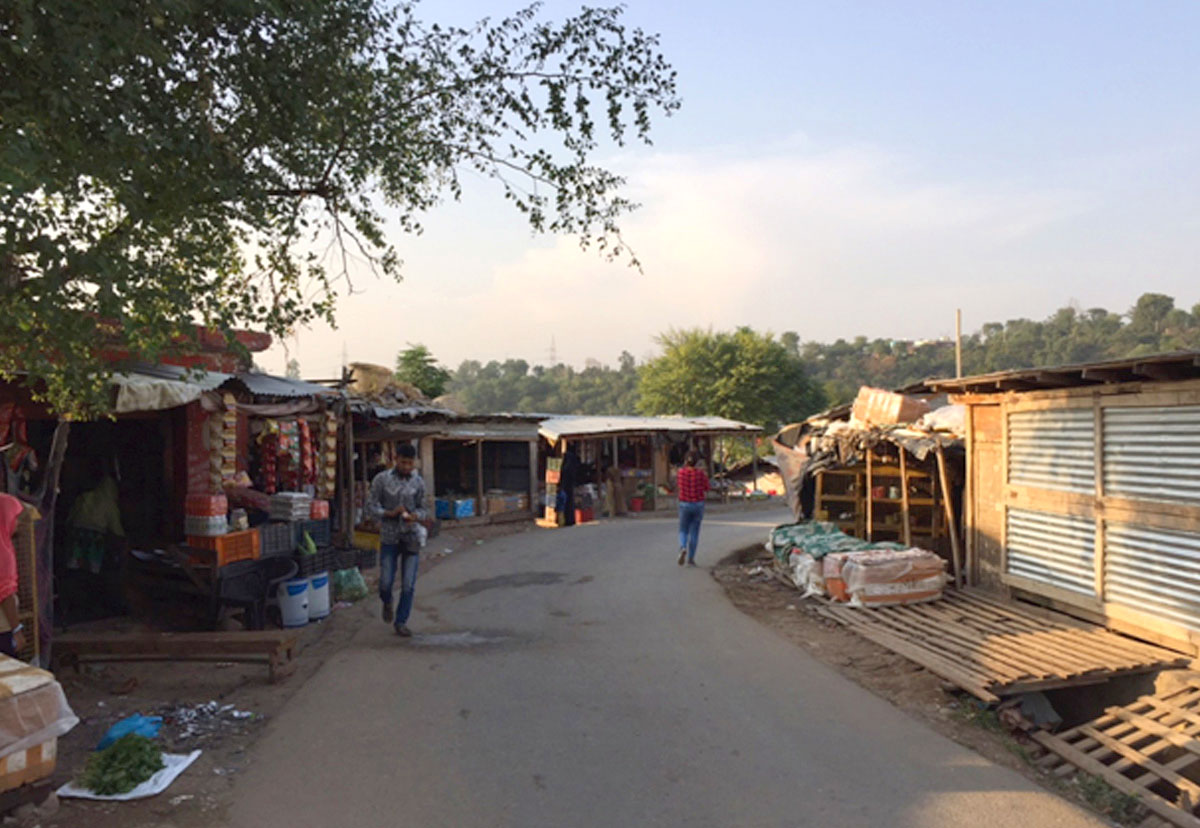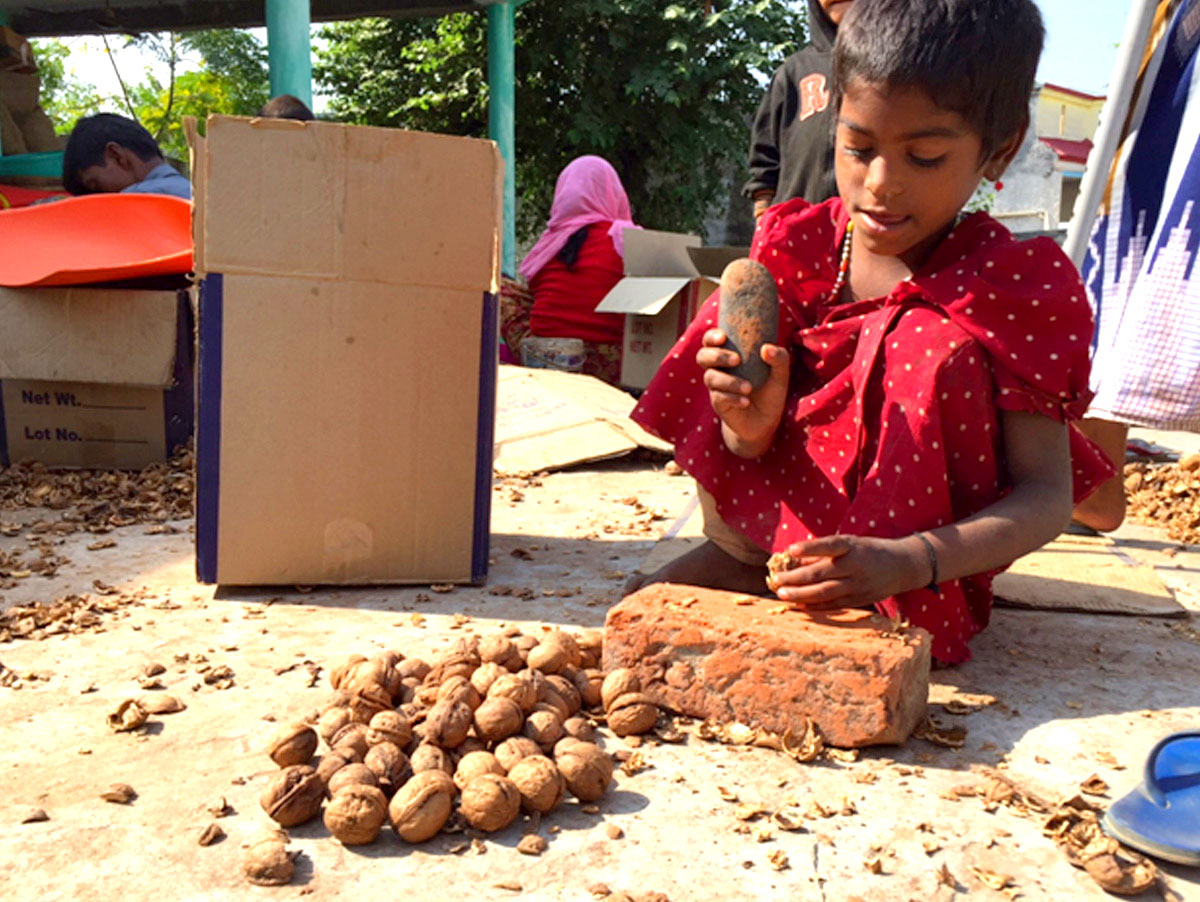Despite being UN listed refugees, the Burmese living in Jammu do not see any major shift in the attitude of the host population towards them, reports Umar Sofi

Mohammad Hanif, 21, is busy smoking in a back alley of a Rohingyan refugee camp in Jammu’s Narwal. As the noise of chattering children coming from one the shacks around, he douses his half-smoked cigarette off and puts it in his tattered old jeans. He walks into this noisy shed and a pin drop silence takes over.
This is nothing but a classroom of refugee children. A history graduate from Sahikalal college of Myanmar, Hanif, has volunteered to teach the refugee children after they were denied admission by the state-run schools in Jammu.
“I don’t feel contended in teaching these children what their books suggest – religious equality and pluralistic society. There is no purpose of teaching things which do not exist,” Hanif sobs. “Once, in a week, at least, I deliver a lecture on the history of Myanmar but nothing with regard to the conflict there. I don’t want them to hold grudges against their homeland. Not today, but maybe somewhere tomorrow, I believe, we all will be deported back to die.”
The 5000-odd Rohingyas have been living in Narwal for many years. There are few small settlements in Channi and Nagrota as well. They fled escaping the pogrom that Myanmar’s Buddhist Government presided over.
The refugees are caught in a serious crisis. As they were fleeing from, India permitted them on basis of humanity. “But the locals here are leaving no stone unturned to throw us out,” Abu Hassan, 28, who runs a tailor’s shop in one of the shacks, said. “We will be simply massacred once we go back. Is this humanity?”

Abu Hasaan arrived in Jammu, in 2009 along with his sister and old mother.“We boarded a train at Kolkata after fleeing Myanmar,” Hasaan said. “Some NGO people provided us with some food and money. The train came all the way to Delhi. However, there was too much congestion and we ran for days without any food. Then, we shifted to Jammu and stayed around the railway station for a year almost.”
Initially, Hasaan worked as a coolie. By then, many more joined them. Then the entire flock shifted Narwal and Nagrota outskirts where they are living a “miserable life”.
Not all Rohingyas living in Jammu lie in abject poverty. The educated had taken small- jobs at some private enterprises of Jammu and even in Kashmir, while others, worked as a day off labourers initially. Almost every individual would earn more than Rs 7000. But the refugees say their crisis worsened after 2014.
Mohammad Ayoub, 45, sells fish in one of the shacks. “It was all fine in the beginning when we arrived here,” Ayoub said. “Every family had four to five working members and each one would earn Rs 5000. It was enough for survival. However, the local labour association protested claiming Rohingyas had taken over their jobs. “Seemingly, this was a motivated agitation,” Ayoub said.
This forced a job conversion. Now, most of the refugees are rag pickers. They collect plastic containers and thrown away cans from Jammu’s garbage dumping sites and make around Rs 100 to Rs 150, a day. They pay for everything. Their ramshackle tarpaulin-tin sheet shacks cost Rs 1500 a month for a 100 sq ft area.

“We hardly earn Rs 3000 a month,” said Ayoub, who is part of a 9-member family. “Our shack is a bit larger and costs us a hefty Rs 2000. It is nearly impossible to manage the food for nine people from such meagre income.”
As the men are into rag picking, women, children and the elderly in the area work as walnut breakers. “Kashmir has been kind to us,” Shahida, 27, who works whole day along with her daughter, said. “We break the walnuts of the Kashmiri traders. We break the nut, and pack the kernel.”
The low-income and joblessness have seriously impacted the refugee living conditions. Even, rag picking has landed some of the refugees in police lockups. They are under police surveillance even when cleaning Jammu!
“I worked as a labourer at a Narwal cement store. After the agitation, I left it and some of us started rag picking,” Abdul Rasheed, a member of the national refugee committee of Rohingyas. “Barely three days after, we were summoned to the nearby police station and accused of theft.”
Rasheed and his other rag-pickers spent a dozen hours behind the bars. They were let free without letting them know what they had stolen. Since then, they are frequently being summoned, retained for a few hours and let free with a warning. “We never discovered a diamond in a dumping site.”
The anti-Rohingya campaign added to their crisis since 2016 as a prominent section of society accused Rohingyas of heinous crimes like drug trafficking, flesh trade and even human trafficking. Even public threats were issued. The campaign created a situation that, police apart, commoners started visiting their shacks to recover “stolen items”. “People from far away districts, sometimes, accompanied by police would come into our settlements and search our shacks to check if we had stolen their belongings,” Hussain, 61, the Zimmadaar (custodian) of the Narwal settlement, said. “We are here to save our lives, dignity and faith.”

The atmosphere turned dreadful after alleged Pakistani intruders attacked the Sunjwan army camp. All of a sudden, the Rohingyas were part of the prime time TV.
It led to some attacks in which a few shacks went up in flames. Police knew the attackers because they were stopped by them but there was no follow up action. The boycott became harsh and stiff, instead. Even if a refugee can afford to rent a room, he will still have to live in a shack.
Even the Jammu Chamber of Commerce and Industry threatened to launch an “identify and kill movement”.
National Panther’s Party maligned their image by alleging the refugees selling their women.
Jammu Bar Association joined the chorus. “If the people of Jammu have the tricolour in their hands today, tomorrow they can even have bombs and AK-47s,” Bar president B S Salathia said. “If you will not remove Rohingyas from Jammu, then we have the right to remove them with any weapon. If you have the mettle, ask the police or even the CRPF to stop us.”
In September 2017, Police detained 13 refugees. They were beaten to the pulp because the carcass of a dead cow was found in an empty land, near their Channi Himmat settlement.
“We were beaten with rods and lashed with belts,” Noor Hussain who was arrested along with others as they stepped outside their mosque. “We wailed, telling the police that how can someone hurt the religious sentiments of a host population when he has been persecuted for his own faith, but they kept torturing us.”.
Some were detained for 11 days without being produced before the court. “Even, my infant son kept on crying but to no mercy of the policemen”, says a woman who was detained with her four-day-old infant.
“I am not posted at Channi right now,” Sajjad Mir, the erstwhile SHO, said. It was in response to a consistent insistence that Mir admitted: “Yes, I had detained some three Rohingyas.”
Was it three or thirteen?
“Yes, somewhere around that, only. I have a career spanning over 20 years. I don’t have time to keep a note of whom I detain and for what crime,” Mir said and hung up.
Since the society and people accused them of thefts, the refugees suffered multiple arson attacks. They alleged that somewhere in August, some men came on a motorcycle during the dead of the night along with petrol cans to set them ablaze. Local Gujjars’ living nearby interrupted and saved them. Some people come during nights and pelt stones on our shacks and flee. “A Gujjar and a journalist had a problem in between but later the media spread the fake news that we attacked the scribe,” one resident said.
Rafiq, a tea seller who has suffered a spinal cord injury, walks with the support of a stick. “I belong to the border district of Myanmar. When my village was attacked, I ran for my life and fell into a drain, and my spinal cord was injured,” Rafiq said. “I went to Bangladesh for treatment. However, when I returned to Myanmar, to my astonishment, I could not even find a trace of my village. It was burnt to ashes and the residue was even cleared off.”
Rafiq says the situation has not changed much. “But I am sure, If I die here, I will get a shroud,” Rafiq said. “That is not possible back home.”















